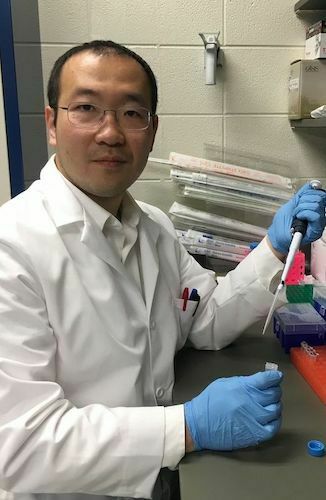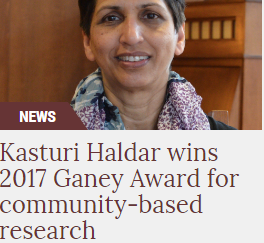Faculty
Congratulations to Dr. Xin Lu for receiving the 2021 Young Investigator Award from Society for Basic Urologic Research (SBUR)!
Dr. Xin Lu received the 2021 Young Investigator Award from Society for Basic Urologic Research (SBUR). SBUR, formed in 1986. is the pre-eminent US-based urologic research society. The SBUR Young Investigator Awards are given to SBUR members who are under the age of 45, within 5 years of their first faculty position, and have made significant contributions to Urologic Research. This award is presented annually at the fall meeting to 2-3 scientists. This year, Dr. Lu won the award together with Dr. Irfan Asangani from University of Pennsylvania. During the 2021 SBUR Annual Meeting (Nov 4-7, 2021), Dr. Lu presented an acceptance speech and a seminar entitled "Prostate cancer and penile cancer: Similarity in immunosuppression".
Dr. Lu’s laboratory is focused on identifying cancer cell intrinsic and extrinsic mechanisms of tumor escape of immune surveillance, particularly in metastatic prostate cancer, breast cancer, and rare cancers (VHL disease, penile cancer). Recent publications from Lu lab firmly establish that immunosuppressive neutrophils (also known as polymorphonuclear myeloid-derived suppressor cells, PMN-MDSCs), play the predominant role in inducing the exhaustion of effector T cells in the tumor microenvironment across multiple solid tumors. A number of mechanisms and targeting strategies of PMN-MDSCs have been reported by the Lu lab (such as CXCR1/2 inhibitor SX-682, tyrosine kinase inhibitor cabozantinib, cyclooxygenase-2 inhibitor celecoxib), which may open new avenues to sensitize advanced malignancies to immune checkpoint blockade therapy. Dr. Lu also investigates and develops novel immunotherapeutics and molecularly-targeted therapeutics, including antibody-drug conjugates, chimeric antigen receptor (CAR)-engineered NK cells and small molecules targeting transcription coactivators that promote metastasis. Dr. Lu’s research at Notre Dame is supported by federal and foundation funding agencies, such as NIH/NCI, Department of Defense, Boler Family Foundation, Walther Cancer Foundation, Susan G. Komen Foundation, American Institute for Cancer Research, Elsa U. Pardee Foundation, Mary Kay Foundation, Indiana-CTSI, and internal funds from centers at Notre Dame such as Boler-Parseghian Center for Rare and Neglected Diseases, Harper Cancer Research Institute, and Warren Family Center for Drug Discovery.
For more information about the award, please visit: https://www.sbur.org/awards-and-lectures
Congratulations to Dr. Xin Lu for receiving the prestigious awards from the Mary K. Foundaton and the Elsa U. Pardee Foundation!
Dr. Lu is the John M. and Mary Jo Boler Assistant Professor, Department of Biological Sciences, Boler-Parseghian Center for Rare and Neglected Diseases. He received these awards for his work on developing novel strategies to target cancers. Dr. Lu studies several different cancers, including rare cancers.

Xin Lu wins 2017 Indiana CTSI Young Investigator Award
May 25, 2017

Dr. Xin Lu, the John M. and Mary Jo Boler Assistant Professor of Biological Sciences, in the Boler-Parseghian Center for Rare and Neglected Diseases, has been awarded a Young Investigator Award from the Indiana Clinical and Translational Sciences Institute (CTSI).
"His work investigates ways to develop cures for rare cancers that are very poorly understood and extremely difficult to treat," said Kasturi Haldar, Rev. Julius A. Nieuwland C.S.C. professor of biological sciences and James Parsons and Carrie Quinn director of the Boler-Parseghian Center for Rare and Neglected Diseases. "He is a leading expert in developing mouse models that can mimic rare cancers caused by human mutations, in which to test new therapies."
Lu seeks to understand and target the tumor microenvironment. Many drugs that can kill cancers are toxic, but if they can selectively be delivered to the cancerous cell and released inside of it, then the drug will more precisely kill the tumor. This reduces the chance that the drug will harm healthy tissue. Lu has proposed a strategy of coupling drugs to antibodies that can recognize targets on prostate cancer cells.
Kasturi Haldar wins 2017 Ganey Award for Community-based research
April 13, 2017
Professor Kasturi Haldar has received the 2017 Rodney F. Ganey, Ph.D., Community-Based Research Award for a project that has helped improve rare disease recognition and treatment in northern Indiana. The award is a $5,000 prize presented annually to a regular faculty member at the University of Notre Dame who has completed at least one research project that addresses a need within South Bend or the surrounding area. Haldar is a molecular cell biologist and the Rev. Julius Nieuwland Professor of Biological Sciences and Parsons-Quinn director of the Boler-Parseghian Center for Rare and Neglected Diseases at the University of Notre Dame.

There are currently about 7,000 recognized rare diseases in the United States, and most medical clinicians will encounter only a small fraction of them even after years of practice in the clinic. So what does a clinician do when a patient with a rare disease appears in her clinic? She might reach out to a rare disease specialist or genetic center for support if she has easy access to either of those. They could provide her with the clinical spectrum of related rare diseases to review and compare with her patient’s symptomatology. But clinicians have demanding schedules and often no ready access to this kind of external support.helped improve rare disease recognition and treatment in northern Indiana. The award is a $5,000 prize presented annually to a regular faculty member at the University of Notre Dame who has completed at least one research project that addresses a need within South Bend or the surrounding area. Haldar is a molecular cell biologist and the Rev. Julius Nieuwland Professor of Biological Sciences and Parsons-Quinn director of the Boler-Parseghian Center for Rare and Neglected Diseases at the University of Notre Dame.
In northern Indiana, clinicians have long had to seek support for rare disease identification and diagnosis from Riley Children’s Health or Indiana University Health in Indianapolis. Because those facilities are distant and often busy, accessing them can be time-consuming, and the key to treatment of any disease is accurate and timely diagnosis and management.
So in 2015, a team led by Dr. Kasturi Haldar, director of the Boler-Parseghian Center for Rare and Neglected Diseases (CRND) at the University of Notre Dame, applied for and received a Ganey Collaborative Community-Based Research Seed Grant for a project to improve rare disease management and treatment locally. The grant helped her and her team partner with advanced pre-med students, local pediatricians, and families of rare disease patients, as well the National Organization of Rare Diseases, the Michiana Health Information Network, and CRND to create a knowledge base and analytic framework for rare disease recognition right here in northern Indiana.
Using the combined resources of this partnership, Haldar and her team have developed a program that trains upper level pre-med students to evaluate rare disease patient medical records and help produce natural histories of disease. They then provide a local pediatric clinic with tools to strengthen the clinical context to manage and treat children with rare genetic disorders, empowering them with the most current data. This decreases the time to proper diagnostic understanding and the establishment of a clear course of treatment. The project also empowers patient families by providing clinicians with up to date information on centers of excellence and other resources that they share with patients. At the Annual Notre Dame Rare Disease Day Conference every February, students also partner with patients to present poster and community-based patient talks.
The project has clearly impacted pediatric health care for rare disease cases in northern Indiana, but its impact has also gone beyond the region. In 2015, Haldar’s team produced a case report of an unusual occurrence of neurofibromatosis (NF1), a rare genetic neurologic disorder. The report, “Aggressive Tibial Pseudarthrosis as Primary Symptom in Infant with Neurofibromatosis, which suggests need for modification of federal guidelines for NF1 diagnosis,” has now been published by Cold Spring Harbor Laboratory’s bioRxiv, where it will be available for review by the scientific community.
Contact: JP Shortall, jshortal@nd.edu